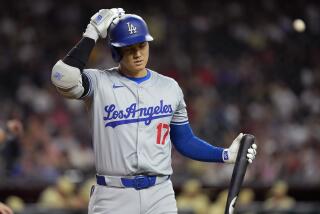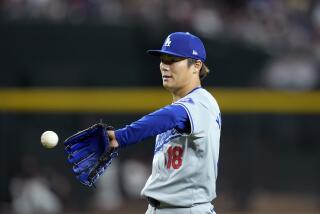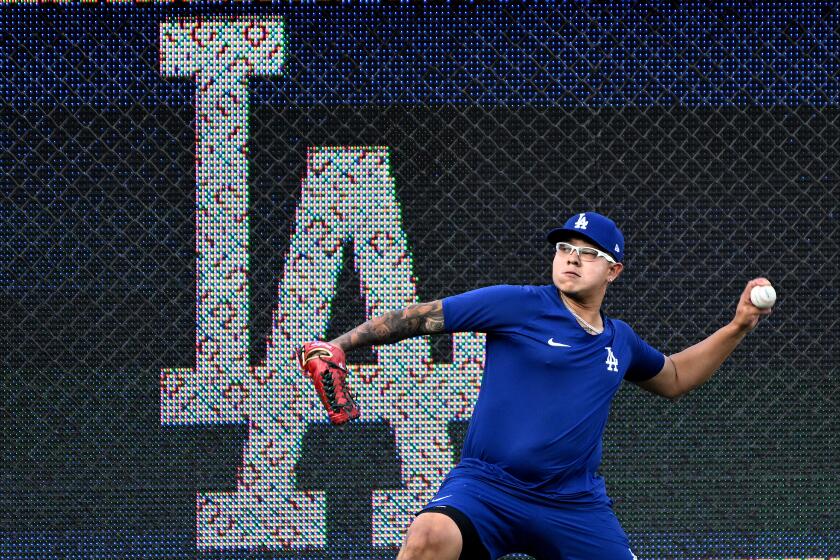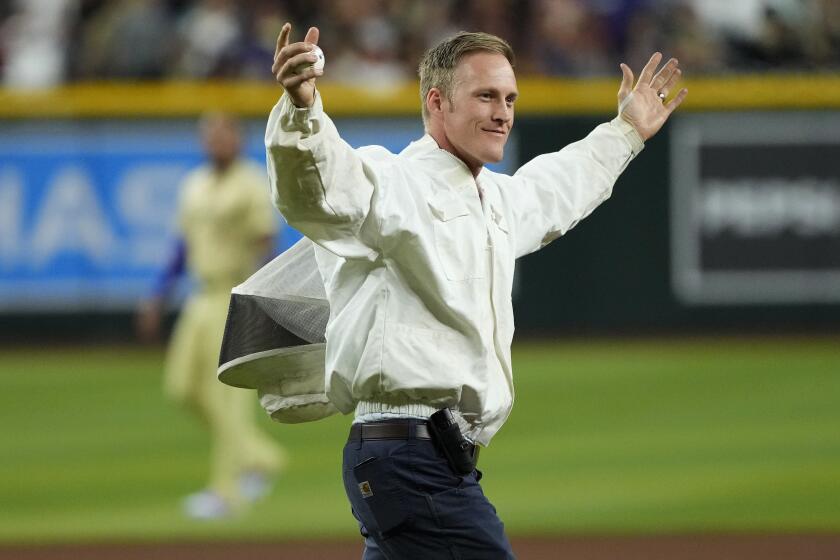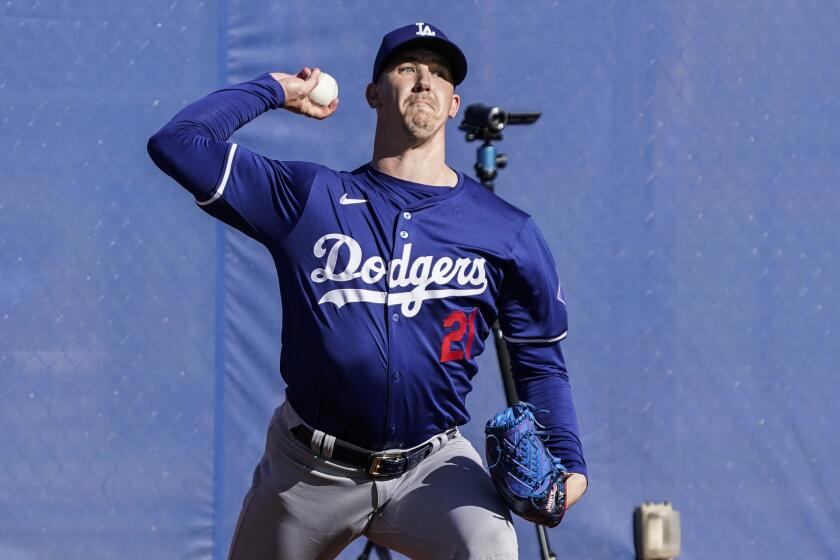Don’t Expect the New Guy to Do Things by the Book
It is easy to throw the book at the new general manager of the Dodgers.
It is easy to suggest that the way it is with the Oakland A’s is the way it will be now with the Dodgers.
After all, hasn’t J.P. Ricciardi, another member of the Billy Beane Alumni Assn., implemented the A’s formula with the Toronto Blue Jays, and isn’t this what Dodger owner Frank McCourt has in mind with his hiring of another Beane assistant, 31-year-old computer whiz Paul DePodesta, over the far more experienced and championship-proven Pat Gillick?
After all, wouldn’t a man who has created skepticism about his operating resources by his leveraged purchase of the Dodgers be intrigued by the A’s successful blueprint?
After all, didn’t he first try to hire Beane himself, and doesn’t he acknowledge having read the best-selling “Moneyball” in which the A’s small-market methods are outlined in depth -- the tighter payroll, perceived emphasis on computers and statistics over scouting, selection of college players over higher-risk high school players in the early rounds of the draft, the stress on offense at the expense of defense, and an organizational focus -- in drafting and development -- on on-base percentage?
Well, who knows?
If a cum laude graduate of Harvard doesn’t have all the answers, as DePodesta acknowledged more than once in his Dodger debut, how are the less gifted among us supposed to respond?
The safe perspective?
Let’s just say it may be too early to assume anything.
Let’s just say that we’ll have to see how the plot takes shape before knowing if this is to be a “Moneyball” sequel amid the big-city spotlight, a new and revised edition or an innovative blend of the two, which McCourt and DePodesta seemed to suggest.
Armed with the security of a five-year contract, DePodesta insisted he had not been given any budget restrictions by McCourt, is intrigued by the resources at his disposal and said it would be a mistake to rely only on statistics or only on scouting.
“The book comes across probably as relatively black and white,” he said, “and yet the subtitle is ‘The Art of Winning an Unfair Game,’ and that’s probably very accurate. It is an art, not a science.
“These are human beings. Computers and statistics don’t play the game. You have to be open-minded. It takes a collaborative effort [of every department] from top to bottom. I mean, I’m not looking to make changes in scouting. I’m looking to change the way we do business.”
Perhaps, but “Moneyball” created impact and controversy, and DePodesta seemed to try to distance himself from the connection even as a National League general manager was saying that if he implements the A’s strategy with the Dodgers “it will be like going from George Bush to Al Sharpton. It wouldn’t be a cosmetic change but a drastic change.”
Under the deposed Dan Evans and scouting director Logan White, a long-fallow Dodger farm system improved from 28th to 14th to fourth among the 30 teams in annual rankings by Baseball America. DePodesta saluted the work of Evans and White in that regard and said there are now some “real studs” in the system.
However, it was Evans’ refusal to trade any of his elite prospects for the needed power hitter that may have contributed to his firing, and DePodesta seemed to be making a point in that regard when he said a farm system serves two purposes: restocking the major league club and providing trade fodder.
From Oakland, DePodesta’s former boss was even more pointed.
“The object is to win games at the major league level,” Beane said by phone, “and not to run around waving a flag and saying how great your farm system is and how much it has improved.”
The A’s, of course, have no reason to apologize for their formula. They have dominated the American League West over the last four years despite small-market resources and constant turnover.
“There’s a method to our madness, and a lot of the method came from Paul’s brain,” Beane said. “I mean, in our situation it’s all about efficiency and risk management, but each situation is unique, and that’s where the misconception is when people talk about the book.
“Paul will have twice the resources with the Dodgers. In that situation, he’ll be very dangerous [to compete against].”
Ricciardi agreed.
“What we’ve done in Toronto has been strictly out of necessity,” the former Beane assistant said by phone. “We had to apply a tourniquet and stop the bleeding. We don’t have the resources Paul will have with the Dodgers. It may be that he’ll follow some basic principles because he’s been grounded in a very successful system and learned from the best in the business [a reference to Beane], but I don’t think the Oakland or Toronto situations will provide a blueprint because the situation in L.A. is so different.”
Ricciardi has reduced the Toronto payroll from $85 million to $48 million in about three years. The full-time scouting staff has been cut from about 40 to 25, and 40 minor league administrators and coaches have been dismissed or not renewed. At the same time, the Blue Jays’ losses have been reduced from $77 million Canadian to $17 million, Ricciardi said, and the club has become competitive again in the high-rent neighborhood of the American League East.
“We won 86 games last year while allowing our ownership a chance to breathe a little,” Ricciardi said. “It’s all about survival in Toronto. I don’t think that’s the case in L.A.”
It isn’t clear what the case is in L.A., although McCourt said Monday that the payroll will remain in the $100-million range over the next two years.
He also said that he “wouldn’t throw everything in ‘Moneyball’ away,” that it would be a mistake to disregard the technological and statistical tools now available, but that he believes strongly that scouting and development are essential to a championship team.
“Paul and I talked about the need for balance,” McCourt said, “and he was receptive to it. In Oakland, remember, he had much more limited resources.... He’s shown a willingness to evolve and grow, and I think that will have him looking at things differently than he did in Oakland.”
How differently -- and how much authority he will have under an owner who intends to keep a high public profile -- is a chapter still to be written.
“Well,” DePodesta said with a smile, “I’ve gone through this entire press conference without the aid of statistics or a computer.”
After Evans and Kevin Malone, there’s nothing wrong with a GM who can take a byte at himself.
More to Read
Are you a true-blue fan?
Get our Dodgers Dugout newsletter for insights, news and much more.
You may occasionally receive promotional content from the Los Angeles Times.

